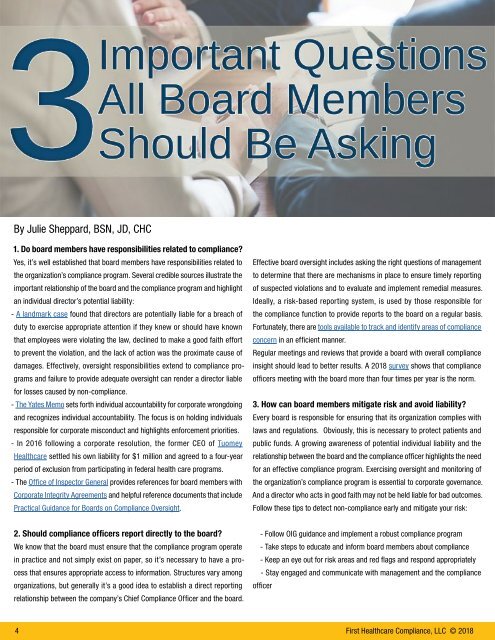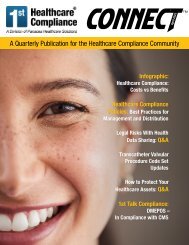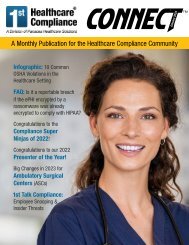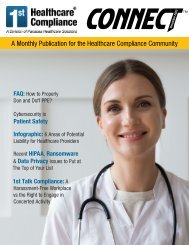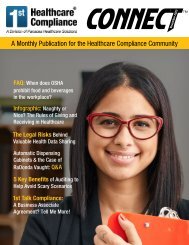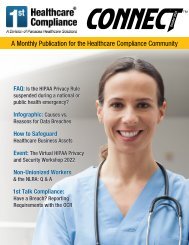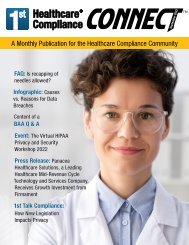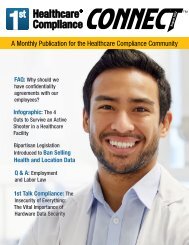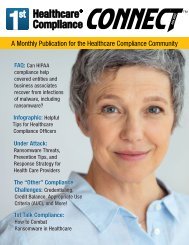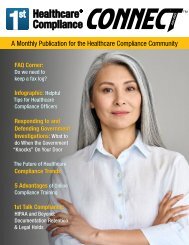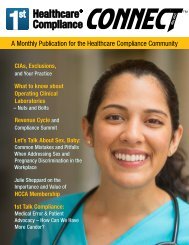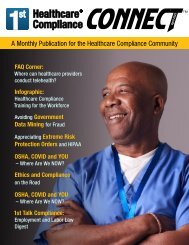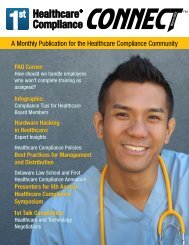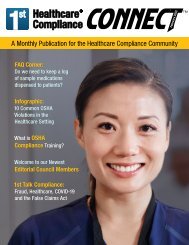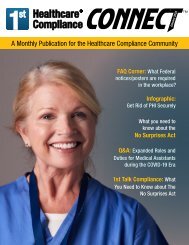First Healthcare Compliance CONNECT July 2018
You also want an ePaper? Increase the reach of your titles
YUMPU automatically turns print PDFs into web optimized ePapers that Google loves.
Client FAQ Corner<br />
I just recieved a HIPAA Authorization for a patient record<br />
that contains psychotherapy notes. How do I respond?<br />
By Julie Sheppard, BSN, JD, CHC<br />
1. Do board members have responsibilities related to compliance?<br />
Yes, it’s well established that board members have responsibilities related to<br />
the organization’s compliance program. Several credible sources illustrate the<br />
important relationship of the board and the compliance program and highlight<br />
an individual director’s potential liability:<br />
- A landmark case found that directors are potentially liable for a breach of<br />
duty to exercise appropriate attention if they knew or should have known<br />
that employees were violating the law, declined to make a good faith effort<br />
to prevent the violation, and the lack of action was the proximate cause of<br />
damages. Effectively, oversight responsibilities extend to compliance programs<br />
and failure to provide adequate oversight can render a director liable<br />
for losses caused by non-compliance.<br />
- The Yates Memo sets forth individual accountability for corporate wrongdoing<br />
and recognizes individual accountability. The focus is on holding individuals<br />
responsible for corporate misconduct and highlights enforcement priorities.<br />
- In 2016 following a corporate resolution, the former CEO of Tuomey<br />
<strong>Healthcare</strong> settled his own liability for $1 million and agreed to a four-year<br />
period of exclusion from participating in federal health care programs.<br />
- The Office of Inspector General provides references for board members with<br />
Corporate Integrity Agreements and helpful reference documents that include<br />
Practical Guidance for Boards on <strong>Compliance</strong> Oversight.<br />
2. Should compliance officers report directly to the board?<br />
We know that the board must ensure that the compliance program operate<br />
in practice and not simply exist on paper, so it’s necessary to have a process<br />
that ensures appropriate access to information. Structures vary among<br />
organizations, but generally it’s a good idea to establish a direct reporting<br />
relationship between the company’s Chief <strong>Compliance</strong> Officer and the board.<br />
Effective board oversight includes asking the right questions of management<br />
to determine that there are mechanisms in place to ensure timely reporting<br />
of suspected violations and to evaluate and implement remedial measures.<br />
Ideally, a risk-based reporting system, is used by those responsible for<br />
the compliance function to provide reports to the board on a regular basis.<br />
Fortunately, there are tools available to track and identify areas of compliance<br />
concern in an efficient manner.<br />
Regular meetings and reviews that provide a board with overall compliance<br />
insight should lead to better results. A <strong>2018</strong> survey shows that compliance<br />
officers meeting with the board more than four times per year is the norm.<br />
3. How can board members mitigate risk and avoid liability?<br />
Every board is responsible for ensuring that its organization complies with<br />
laws and regulations. Obviously, this is necessary to protect patients and<br />
public funds. A growing awareness of potential individual liability and the<br />
relationship between the board and the compliance officer highlights the need<br />
for an effective compliance program. Exercising oversight and monitoring of<br />
the organization’s compliance program is essential to corporate governance.<br />
And a director who acts in good faith may not be held liable for bad outcomes.<br />
Follow these tips to detect non-compliance early and mitigate your risk:<br />
- Follow OIG guidance and implement a robust compliance program<br />
- Take steps to educate and inform board members about compliance<br />
- Keep an eye out for risk areas and red flags and respond appropriately<br />
- Stay engaged and communicate with management and the compliance<br />
officer<br />
Psychotherapy notes are primarily for personal use by the treating professional<br />
and generally are not disclosed for other purposes. The provider should review the<br />
definition of psychotherapy notes under HIPAA and remove any of this information<br />
from the patient’s file before disclosure. Under HIPAA, psychotherapy notes is<br />
defined as follows: Notes recorded (in any medium) by a health care provider who is<br />
a mental health professional documenting or analyzing the contents of conversation<br />
during a private counseling session or a group, joint, or family counseling<br />
session and that are separated from the rest of the individual’s medical record.<br />
Psychotherapy notes excludes medication prescription and monitoring, counseling<br />
session start and stop times, the modalities and frequencies of treatment furnished,<br />
results of clinical tests, and any summary of the following items: Diagnosis,<br />
functional status, the treatment plan, symptoms, prognosis, and progress to date.<br />
(See 45 CFR 164.501).<br />
Do I need Safety Data Sheets (SDS) for cleaning<br />
products?<br />
SDS must be maintained for all hazardous chemicals and are obtained directly<br />
from the manufacturer, distributor, or importer. This requirement includes<br />
hazardous cleaning products. An exception exists for household consumer<br />
products used for cleaning (if used in the same manner as a consumer would<br />
use them) Such cleaning products do not require SDS to be maintained.<br />
Explore the FAQs tab in your compliance solution to find<br />
answers to your compliance questions!<br />
4 <strong>First</strong> <strong>Healthcare</strong> <strong>Compliance</strong>, LLC © <strong>2018</strong><br />
Contact Toll Free: 888-54-FIRST 5


